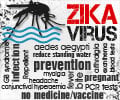Highlights
- Infection with the mosquito-borne Zika virus during pregnancy can cause the baby to be born with a small head (microcephaly)
- A research team from Florida State University, the Johns Hopkins University and the National Institutes of Health investigated compounds that are already in use, in clinical trials or pharmacologically active to find a drug that is effective against the Zika virus.
- One possible candidate is niclosamide, a drug that is used in the treatment of tapeworm infection and is safe in pregnancy. Another is emricasan, which is being investigated in certain liver diseases.
The researchers tested around 6000 compounds. They identified compounds that stopped the Zika virus from multiplying and others that stopped the virus from killing fetal brain cells.
One of the compounds that prevented the virus from multiplying was niclosamide. Niclosamide is an anthelmintic drug hat is approved for the treatment of tapeworm infection. It belongs to the FDA pregnancy Category B, and is considered relatively safe for use in pregnancy. This plus point could enable its use in pregnant women with the Zika virus, the population that needs the medication the most.
However, there still remain several hurdles to cross before the drug can be used to treat Zika infection. It is not known if the drug can produce the same effect in the human body against the virus as it produced in the laboratory.
Niclosamide is not much absorbed from the digestive tract into the blood, therefore, it remains to be seen how the medication will reach the virus in the rest of the body. The exact dosage and treatment regimen for Zika has still to be established. Niclosamide is currently not available in the United States.
The Zika virus is spread through the bite of an infected Aedes aegypti mosquito, through sexual transmission and from the mother to the baby. Currently, the only way to prevent the infection is to keep mosquitoes at bay. Treatment for the infection is not available; most people respond to symptomatic treatment.
- Xu M et al. Identification of small-molecule inhibitors of Zika virus infection and induced neural cell death via a drug repurposing screen. Nature Medicine (2016) doi:10.1038/nm.4184
- NIH Collaboration Helps Advance Potential Zika Treatments - (https://www.nih.gov/news-events/news-releases/nih-collaboration-helps-advance-potential-zika-treatments)










